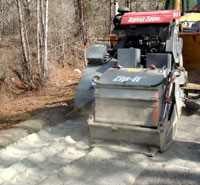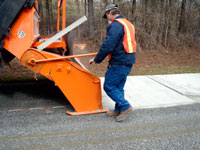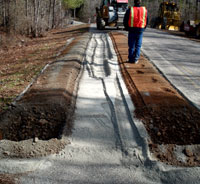In 2005, Elmore County, Alabama, began experimenting with full-depth reclamation (FDR) to meet its growing need to address base failures on a maintenance level rather than by rehabilitating long stretches of roadway.
Elmore County Engineer Richie Beyer was considering FDR for repair projects.
“Years of neglect have lead to a massive amount of base failures on our 750-plus miles of paved roads,” says Beyer. “As a general rule, our base problems are isolated on any given road and do not require the entire road to be reclaimed. The damage is so widespread that, unlike many counties which rehabilitate an entire road in a year with much more costly and larger equipment, Elmore County needed to modify the process of road reclamation to address problems on a smaller scale.”
Beyer was looking for a process that would minimize resources and labor by recycling materials in place while limiting the outlay for equipment and providing more flexibility in its use.

On the equipment side, the county decided to purchase a 30-inch-wide road reclaiming/milling attachment that operates in association with a loader. This piece of equipment, the AZ 300 from Asphalt Zipper, was selected for its flexibility and its compatibility with the county’s existing equipment. Because it functions as an attachment to the loader rather than as a stand-alone piece of equipment, crews could shift from base work and FDR to other tasks in a matter of minutes.
Elmore County uses an Asphalt Zipper reclaiming-milling attachment that works with a loader.
The county also experimented with different types of road reclamation processes and materials to use to stabilize the roadway. After many months of experimenting and monitoring performance, the county decided that the addition of portland cement into the reclamation process provided the most effective and cost-efficient results.
Beyer also refined the method of distributing cement on the pavement. Initially, workers manually distributed bags from the back of a dump truck. Through trial and error, the county retrofitted a dump truck with a modified chip spreader to distribute an even amount of cement over the roadway. The process resulted in only minimal dusting and required no heavy lifting. The county now loads the dump truck with cement at a local ready mix plant and distributes it as needed.

The process meets Beyer’s goal of maximizing the use of limited resources while addressing a major need in the county in a minimal amount of time. The county has established a procedure for FDR that utilizes a three-man crew, a loader, the Asphalt Zipper milling attachment, a single axle dump truck, and a vibratory smooth drum roller.
Cement is distributed evenly over the roadway with a modified chip spreader.
The process also minimizes road closings and inconvenience to the driving public. The FDR work can be performed in a single lane. The work zone is small and contained, allowing the county crew to complete its work and move to the next site or road.

The Asphalt Zipper pulverizes the failed asphalt roadway and mixes it with cement.
Beyer says his crew can reclaim a hundred-foot-long stretch of road in few hours while maintaining traffic in the adjacent lane.
To honor their work in developing this innovative process, Beyer and his crew received the Excellence in County Engineering Award from the Association of Country Engineers of Alabama.